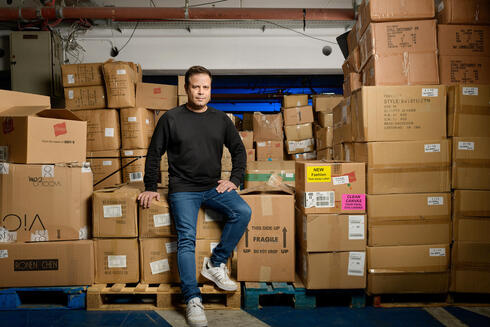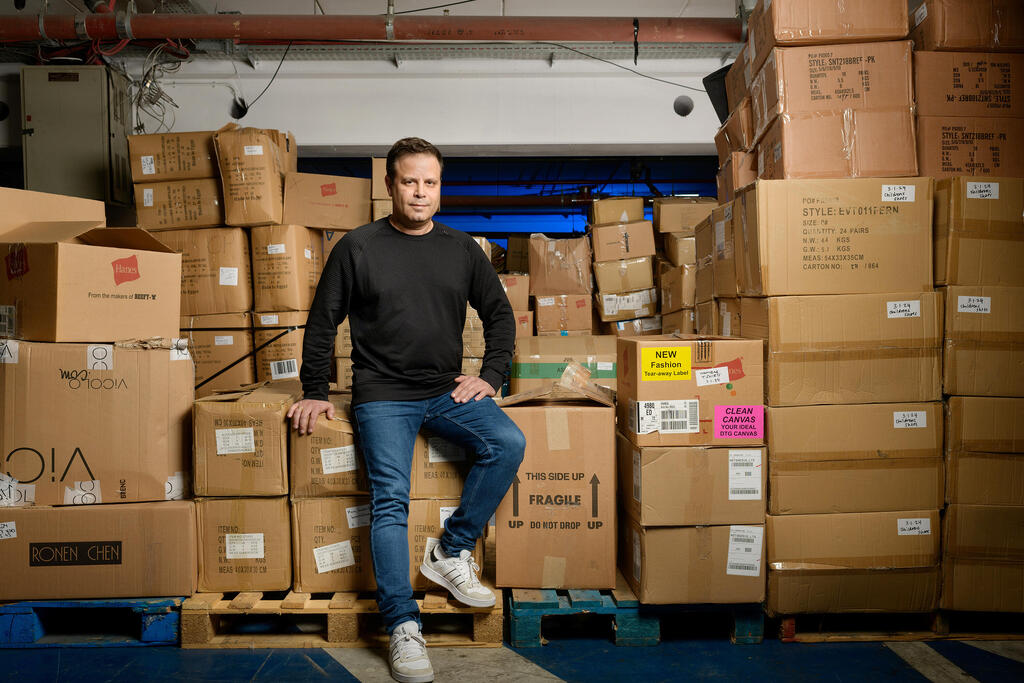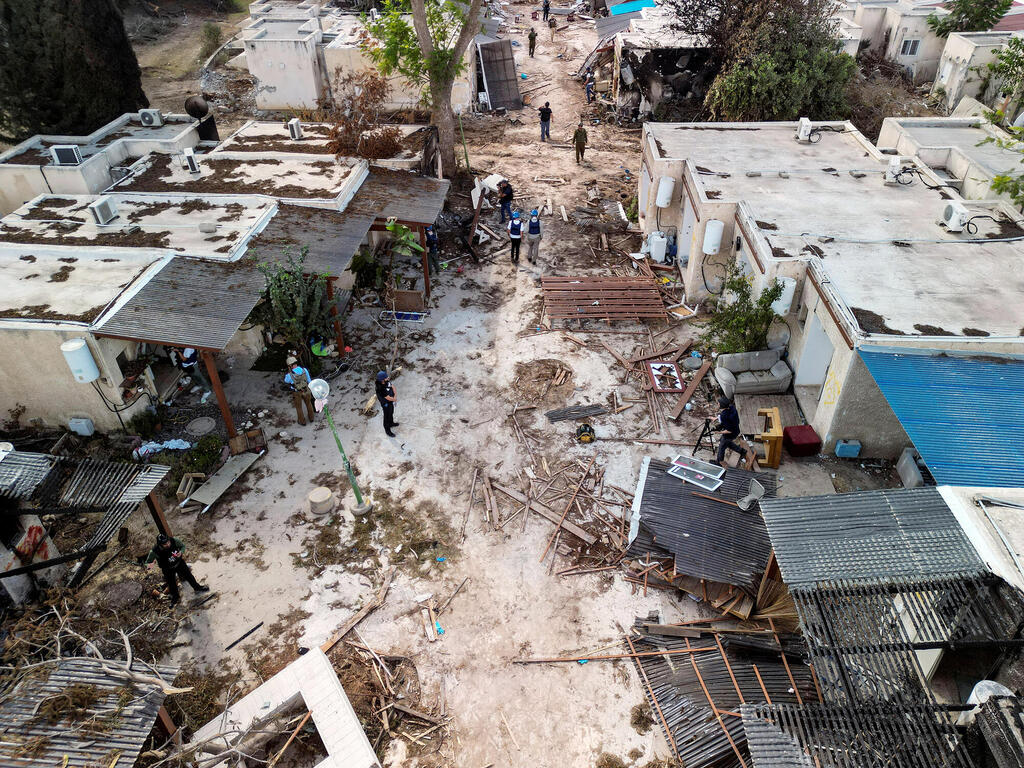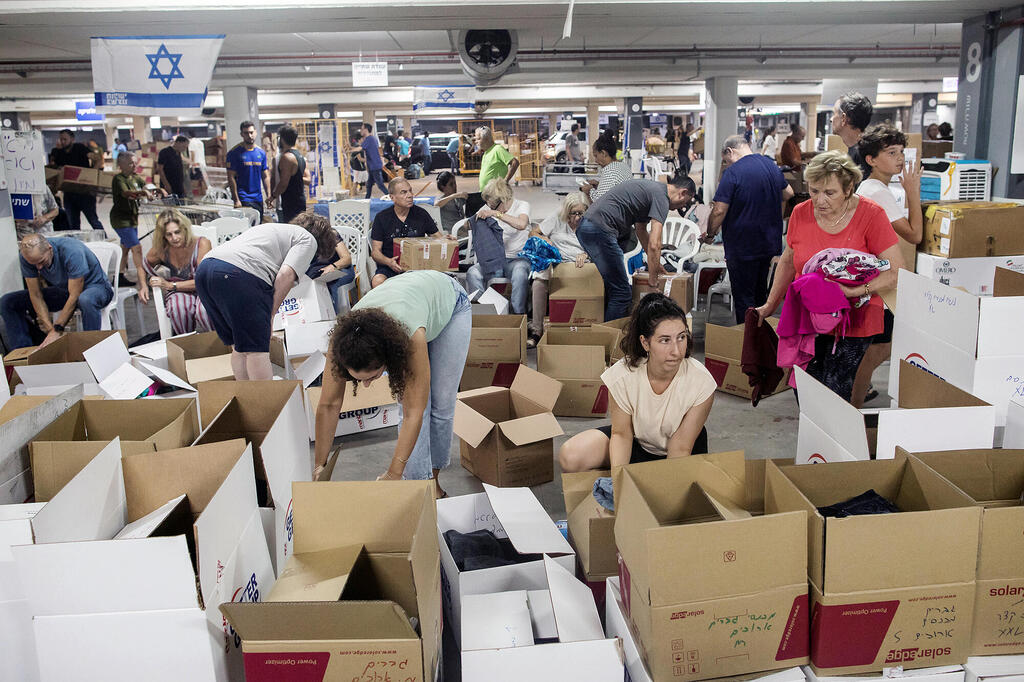
The Israeli unicorn that prepared for disaster and saved lives on October 7
Guy Bloch, CEO of the unicorn Bringg, had a gut feeling that something was going to happen, and prepared a contingency plan to save his company for when disaster would strike. Then, on October 7, he discovered that the software used to manage the shipments of American giants could also manage the rescue of survivors from Gaza border towns. In his first interview since, he explains how it all happened, and what he learned along the way
26.3.2023
"On that night, the night that Netanyahu fired Defense Minister Yoav Gallant (who was later brought back), I understood that there would be a war in Israel," says Guy Bloch. "The writing was on the wall. And that night I realized that I had to prepare my company for war."
Guy Bloch is the CEO of Bringg, a company that has developed software for managing logistics and deliveries, and is already worth more than a billion dollars. That night, when the Prime Minister announced the dismissal of Defense Minister Yoav Galant after he called for the judicial reform to be stopped because of the dangers inherent in it, Bloch saw the future. Hundreds of thousands of Israelis spontaneously went out to protest in the streets, but Bloch understood something deeper, which simmered in him and became even more acute on July 24, when the Knesset passed the law abolishing the reasonableness standard in court rulings (which has since been struck down by the Supreme Court).
What did you actually understand in those months?
"The Gallant firing set off a warning light for me that something might happen, and as time passed and we got closer to the vote on abolishing the reasonableness standard I realized that something bad was happening below the surface. This was clear from the way the Chief of Staff, the Minister of Defense and the IDF generals travelled to Jerusalem to talk with the members of the Knesset and the ministers before the vote, but they did not want to listen.
"I was troubled not only by what was happening in Israel, but also by the consequences for Bringg. We have 800 customers worldwide. I lived for years in the United States, built my career working with American organizations, and it was clear to me that in the event of a war we would receive five minutes of empathy from them - and then zero minutes of patience."
What does this mean for you as a company?
"Bringg's system manages the entire last mile of the delivery process, and thus accounts for 50% of the delivery cost. Our delivery operating system connects everything, orders, warehouses, drivers, in order to optimize the process so that the most suitable driver receives the delivery and everything will be faster and cheaper. The infrastructure of the last mile is critical, if it doesn't work, the customer can't deliver the products to their customers. So I realized I had to do something."
16.8.2023
Israeli intelligence warning to secret Knesset subcommittee: "The enemy recognizes that this time the situation is different". The secret subcommittee convened for an important discussion on the situation of the IDF, and a senior member of the IDF warned that the enemy recognizes that this is a different situation, as reported by Moriah Asraf Wolberg of Israel's Channel 13 news.
With this feeling, Bloch walked around for another three weeks, until he came across another disturbing headline. "This news definitively and unequivocally set off the warning lights for me," he says in his first interview since October 7, discussing what has happened to Israeli society as a whole and to his company in particular in the months that have passed. "I convened the members of Bringg's management and said that we must build a simulation, a contingency plan for the company's activities, for a situation of a multi-front war. I asked myself and them how to ensure that the company continues to operate as usual, and we built a complete simulation at the management level, from the basic assumptions to a detailed response to events at every possible level. The idea is that if the scenario comes true, in real time you just press play and do what is written in the instruction manual."
Half of your board members are American, and only half of your 200 employees are in Israel. You posed a horror scenario to them that is based on gut feelings of what is happening below the surface? Weren't you worried that you were just stressing them out?
"They know all about Israel and they have experienced with the Israelis the last rounds of combat, including Operation Guardian of the Walls. And this time it was clear that it would be more than that. It was not just me, everyone said it, and the army warned it could happen. I don't know what exactly happened in the cabinet and what Bibi thought, knew or didn't know, but I understood that we are heading towards an event that I obviously won't be able to control, but that I will have to control the way its effects Bringg's customers, employees, investors and partners."
So what plan did you build?
"The assumption was that there would be some extreme event and then an escalation for about four days - what I had in mind was the Second Lebanon War. We built a plan for a scenario in which we would not be able to leave the shelters for two or three weeks and there could also be damage to the internet infrastructure. In such a situation, the first action we planned was a letter to the employees, which would go out immediately saying: 'We are here, we understand the event and we are on it. You take care of your families and your health, be with your family.' The second thing is a letter to customers that says: 'We know what is happening, everything is under control.' In this letter we explained that Bringg's cloud is not based in Israel and that we have support and customer service systems abroad. We also have another development center in Eastern Europe, and we also mentioned that we have upgraded the cyber systems in recent months to be ready for any scenario."
Okay, so first you wanted to calm everyone down, then what?
"We built a flow chart of required actions, including who does what. We divided Bringg so to speak into two companies, an Israeli and a foreign one, so that there would be no dependence on managers and employees in Israel, and everything could work without them. We compiled a list of the Israeli employees who are most critical to the functioning of Bringg, for the work of the product itself, such that if they could not be reached for two or three days, this would mean harm to the customers, and for these employees, precise evacuation plans were built, where they would go, how we would fly them to London or Chicago, where we have large offices. In retrospect, by the way, we realized that not one of the workers in Israel was willing to leave the country."
Even in this approach, the gut feeling and the cogwheels in Bloch's head were spinning. On October 7, we saw a dysfunctional army, and on that day and in the three months since, we have seen dysfunctional public systems. Bloch knew that he did not want that to happen with his company. Building simulations for various extreme scenarios is a common practice in large organizations, especially regulated ones - banks, insurance companies, infrastructures - but in the high-tech world it is not customary, certainly not in startups like the 10-year-old Bringg. Such companies focus on flexibility and agility, rapid growth and adaptation to customer needs. They don't think about disasters (even if the disaster is the collapse of the institution where their funds are held, as happened with Silicon Valley Bank in March). This is true for the entire industry, and it is certainly true in Israel, where things can often get messy.
But Bloch knew all about the playbook approach from his time in the U.S., where people are less inclined to assume that everything "will be fine". "This is not an American approach, but a conscious approach," says Bloch. By the way, he also used it at the beginning of the Coronavirus crisis, in April 2020, when Bringg was one of the first companies in Israel to lay off a tenth of its employees with the understanding that it was necessary to become more efficient in preparation for a protracted crisis.
26.9.2018
"I had an amazing and fun life in the United States, but there is no place like Israel."
Bloch (50) grew up in Israel, studied here for a bachelor's degree in hotel and tourism management at Ben-Gurion University, and at the age of 26 went to New York to do an MBA. After the degree he did not return, but began to advance in management positions in the high-tech world, mainly at the American software company Splunk (which four months ago was sold to Cisco for $28 billion). "In 2016 I was appointed manager of the EMEA region (Europe, Middle East and Africa) at Splunk. My wife is Israeli, the children were small, and this was an opportunity to move the family from the United States to Israel. I moved to London and traveled back and forth. During one of my visits to Israel, I met Michael Eisenberg (founder of the Aleph venture capital fund, which invests in Bringg) and he said to me: 'Come on, come back, for 20 years you helped build Silicon Valley, now come help me turn Startup Nation into a mature nation. He introduced me to Bringg, I fell in love, and at the end of 2018 I joined the company."
Bringg was then at a critical juncture: a 5-year-old company with an interesting technology - which needed to become a product that strategic customers would be willing to pay for. The idea behind the company's product is to allow any retailer to manage a delivery system as if it were Amazon, and deliver the products quickly, on the same day, within hours, sometimes less. Bloch calls it "democratization of the last mile". Take for example AutoZone, a supplier of auto parts; Bringg’s software allows it to commit to delivering the parts to the garages within 25 minutes of the order, because it manages the vehicle fleets and the array of drivers as efficiently as possible, aiming not only for fast delivery but also doing so at minimal costs.
And it is a market with tremendous potential. "75% of the companies in the United States still entrust the last mile to FedEx or DHL," says Bloch, "and this does not allow them to compete with Amazon. Statistics show that more than 80% of customers who have had a bad experience twice will not return to the same supplier."
Part of the potential was realized during the Covid-19 pandemic, when deliveries prospered, and Bringg saw its number of customers triple, including giants such as Walmart, Coca-Cola and McDonald's. In 2021, it became a unicorn, raising funding at a value of one billion dollars. Bloch announced at the time that the company is targeting an IPO, but the next two years were characterized by a big hangover in the world of e-commerce. The lull that arrived after the boom of the pandemic and subsequent interest rate increases resulted in the IPO being postponed. Customers left, and Bloch had to initiate layoffs and empty one of the two floors of office space Bringg had at Azrieli Towers.
He took solace in the loyalty of some of the biggest customers, including Burger King, the Tim Hortons coffee chain and supermarket chains. And all in all, he feels that the company has stabilized. He says that as of today, about 200 million deliveries are made per year based on its software. "Despite the complex situation in the markets, we also grew in 2023, but not at the rate we would like. I hope that 2024 will be better."
7.10.2023
"My daughters woke me up in the morning and said missiles are being fired at Israel. I immediately spoke to the managers in Israel, in the meantime terrible videos started leaking, and we realized that the escalation went from 0 to 100 immediately, and not over four days, as we estimated in our worst-case scenario."
On October 7, Bloch was on vacation in London with his wife, two daughters and son, aged 16, 13 and 8. As he was exposed to more and more horror reports, he pulled out the contingency plan. "We pressed play, and everything worked. The customers and employees were shocked that at 12 noon they already received the letters we had prepared in advance. David, who manages our operations in London, took responsibility for everything related to customers, and knew that he did not have to wait for me or talk to me, but to make decisions himself."
But then the plan took a turn. Very quickly Bloch realized that Bringg should not only take care of itself, but also enter the terrible vacuum left by the state. "Already on October 7, members from various high-tech companies, and especially from the Aleph fund network, started talking about the flood of inquiries that are coming to them from the Gaza border towns, hundreds of WhatsApp messages with requests for assistance," he explains. "Actually, in the first 48 hours, everyone was busy fighting and not rescuing the thousands of people who were still stuck in the area. Ami Daniel, CEO of Windward (which provides services for maritime transport), set up a headquarters at his house. I sent two workers to him, and they activated our system there. Over time, most of the workers in Israel took part in this rescue project that allowed them to keep their sanity and disconnect from the news."
What exactly did you do?
"Our system made it possible to coordinate, first of all, the rescue of the families from the Gaza border towns, which was quickly activated from the war room of Brothers in Arms in Beit Kama. We heard the terror in people's voices when they turned to us, trapped in bomb shelters, and we heard the appreciation after the rescue," he says with pride and excitement. As an example, he plays me a message from a woman who is grateful for the evacuation of her family from Kibbutz Be’eri. "Then we moved to rescuing dogs and cats that were left in the kibbutzim and were important to the families. We brought them in as well. Then the focus shifted to transporting people to their family members who were hospitalized in various hospitals throughout the country, and after that we moved to supplying underwear and food to the recruited IDF reserve soldiers. We defined the 'State of Israel' as a customer in the system , and at the peak we had 3,000 drivers performing tasks."
This activity was based not only on the human power of the Brothers in Arms volunteers, but also on two technological platforms. The software company monday.com, which develops an operating system for planning and managing tasks, very quickly set up a system that consolidated the received tasks and organized them in the war room at the exhibition grounds in Tel Aviv. And as soon as there were tasks, Bringg's software came into the picture. "All the drivers and volunteers, thousands of people, downloaded our application, received exact details of where to go and when. We even updated their alerts on locations so they knew where not to enter and where army forces are situated, and with that information they just went in and took families out. The volunteers only needed the app and a gun license."
14.1.2024
"We now have an exciting and fascinating case study. Even if there is an escalation in the north now, God forbid, we are already prepared, if people sit in shelters we can bring them their groceries from the supermarket."
The conversation with Bloch takes place against the background of the events marking 100 days since October 7. The nature of Bringg’s activity has changed over the course of the last three months, he says. "After about a month, we saw that there was a decrease in the need for our platform, and the volunteers also returned to their regular workplaces."
And what did it do for you as a company?
"I felt that this whole month helped the employees a lot, created a singular pride that our product has become so critical in a task for which it was not intended in the business plan. And unexpectedly, the experience also greatly improved the product itself - usually any change or addition of a feature involves a lengthy process of discussions with a lot of considerations, but here we simply introduced a lot of new things and innovations along the way, with unprecedented speed. The only consideration was that it would work: if it worked - it was accepted."
In addition, Bringg is now also working with monday.com on a new product. "As a result of this experience and the knowledge we have gained, we are currently working on a joint system with monday for managing crises. It is suitable not only for an 'Israeli' event such as a war, but mainly for cases of earthquakes or tsunamis in which quick and effective rescue systems need to be set up and managed."
How do employees return from a life-saving project to the routine work with clients who are not living in a state of war?
"It's amazing. The employees spent two weeks committed and dedicated only to this project and when they returned to work and to the customers, they jumped right in. Our employees felt that they were doing something great, and with this spirit they returned to work in an atmosphere of 'let's go, let's finish 2023 and start 2024 as strongly as possible'. The customers have also been amazing. I received so many emails checking to see that we are fine, and there is no anti-Semitism. I have 17,000 followers on LinkedIn, most of them from abroad, and this whole community supports the company."

















